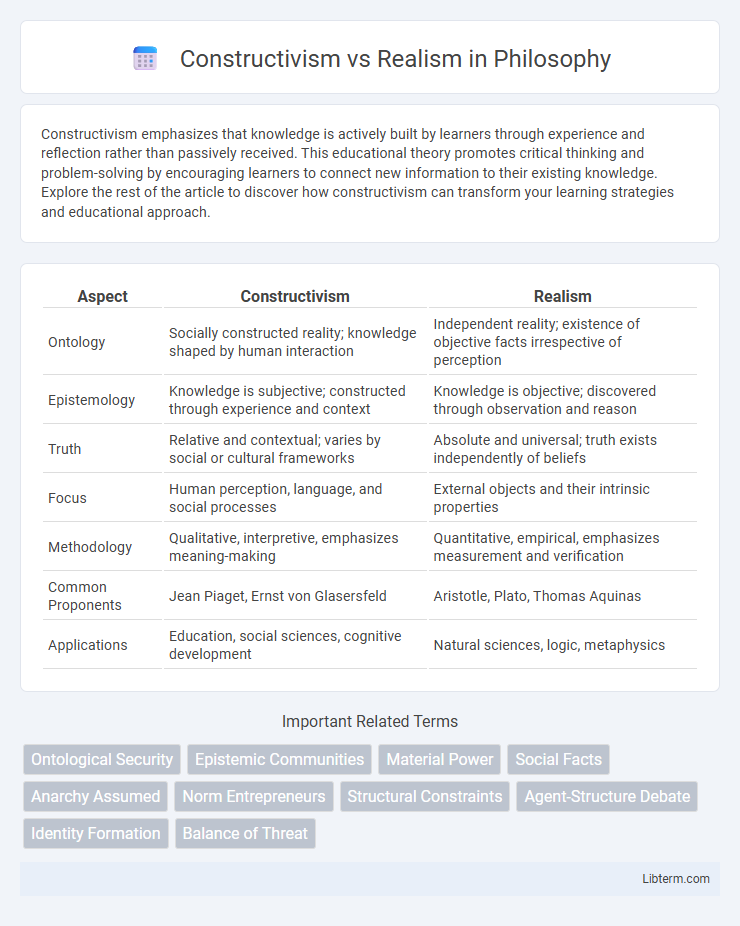Constructivism emphasizes that knowledge is actively built by learners through experience and reflection rather than passively received. This educational theory promotes critical thinking and problem-solving by encouraging learners to connect new information to their existing knowledge. Explore the rest of the article to discover how constructivism can transform your learning strategies and educational approach.
Table of Comparison
| Aspect | Constructivism | Realism |
|---|---|---|
| Ontology | Socially constructed reality; knowledge shaped by human interaction | Independent reality; existence of objective facts irrespective of perception |
| Epistemology | Knowledge is subjective; constructed through experience and context | Knowledge is objective; discovered through observation and reason |
| Truth | Relative and contextual; varies by social or cultural frameworks | Absolute and universal; truth exists independently of beliefs |
| Focus | Human perception, language, and social processes | External objects and their intrinsic properties |
| Methodology | Qualitative, interpretive, emphasizes meaning-making | Quantitative, empirical, emphasizes measurement and verification |
| Common Proponents | Jean Piaget, Ernst von Glasersfeld | Aristotle, Plato, Thomas Aquinas |
| Applications | Education, social sciences, cognitive development | Natural sciences, logic, metaphysics |
Introduction to Constructivism and Realism
Constructivism emphasizes the social construction of international relations, focusing on how state identities, norms, and ideas shape global politics. Realism centers on the pursuit of power and national interest within an anarchic international system, asserting that states act primarily to ensure their survival. Both theories provide foundational perspectives on state behavior, contrasting social and material factors influencing world affairs.
Historical Origins of Constructivism and Realism
Realism originated from the works of Thucydides and Machiavelli, emphasizing power politics and state survival in an anarchic international system, deeply rooted in 17th-century political thought. Constructivism emerged in the late 20th century, influenced by sociological and post-structuralist theories, highlighting the role of ideas, identities, and norms in shaping state behavior. These differing historical origins underscore realism's focus on material power versus constructivism's emphasis on social constructs in international relations.
Core Principles of Constructivism
Constructivism emphasizes the importance of social constructs, ideas, and identities in shaping international relations, arguing that the structures of the international system are socially constructed rather than inherently given. It highlights that state interests and behaviors are influenced by normative frameworks, shared beliefs, and collective meanings, contrasting with Realism's focus on material power and anarchy. Constructivism also stresses that power is derived from ideational factors, such as persuasion and legitimacy, rather than solely military or economic capabilities.
Fundamental Tenets of Realism
Realism centers on the belief that the international system is anarchic, leading states to prioritize survival through power and security. It asserts that states act rationally to maximize national interest, often through military and economic strength. Realists emphasize state sovereignty, the inevitability of conflict, and the importance of balance of power to maintain order globally.
Key Differences Between Constructivism and Realism
Constructivism emphasizes the social construction of international relations, arguing that state behavior is shaped by identities, norms, and shared ideas rather than purely material power. Realism centers on the anarchic nature of the international system and prioritizes state sovereignty, survival, and power competition as the primary drivers of state actions. Key differences lie in their views on the role of ideas versus material forces, with constructivism focusing on intersubjective meanings and realism highlighting objective security concerns.
Influence on International Relations Theory
Constructivism emphasizes the role of ideas, norms, and identities in shaping state behavior, challenging the material focus of Realism, which prioritizes power and security. Realism's influence centers on the anarchic nature of the international system and the inevitability of conflict, whereas Constructivism highlights how social structures and shared beliefs evolve over time to alter state interests and interactions. Both theories significantly contribute to International Relations by offering contrasting explanations for state motivations and the dynamics of global politics.
Major Thinkers in Constructivism and Realism
Constructivism, prominently shaped by Alexander Wendt and John Ruggie, emphasizes the social construction of international relations, arguing that state identities and interests are formed through interaction and shared norms. Realism, with foundational thinkers like Hans Morgenthau and Kenneth Waltz, asserts that states operate in an anarchic system driven by power competition and self-interest. These paradigms diverge in their understanding of international behavior, with Constructivism focusing on ideational factors and Realism prioritizing material power dynamics.
Case Studies Illustrating Constructivism vs Realism
Case studies such as the Cold War highlight Realism's focus on state power and security competition, with nations acting primarily to maximize their interests in an anarchic international system. In contrast, Constructivism is illustrated by the post-Cold War transformation of U.S.-Russia relations, where changing identities, norms, and shared understandings influenced state behavior beyond material capabilities. These examples underscore Realism's emphasis on material power and Constructivism's focus on ideational factors shaping international outcomes.
Criticisms and Limitations of Each Approach
Constructivism faces criticism for its perceived lack of empirical rigor and difficulty in predicting state behavior due to its emphasis on ideas, identities, and social norms rather than material factors. Realism is often criticized for its overly pessimistic view of international relations, ignoring the impact of non-material factors like culture and ideology, and for its assumption that states act solely based on power and security interests. Both approaches struggle to fully incorporate the complexity of global politics, with Constructivism sometimes seen as too idealistic and Realism as too reductionist.
Future Relevance of Constructivism and Realism
Constructivism remains relevant in future international relations by emphasizing the role of ideas, norms, and identities in shaping state behavior, which is critical as global challenges increasingly involve non-material factors like cyber security and climate change. Realism continues to provide a foundational lens on power dynamics and state interests, particularly as geopolitical competition among major powers and military capabilities persist. The future relevance of both theories lies in their complementary insights: Constructivism explains changing international norms and cooperation, while Realism accounts for enduring power struggles and security concerns.
Constructivism Infographic

 libterm.com
libterm.com